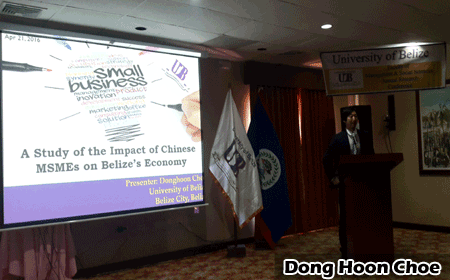BELIZE CITY, Thurs. Apr. 21, 2016–Today, the University of Belize’s Faculty of Management and Social Sciences held its 6th Annual Research Conference in Belize City.
Of the eight presentations made today, it was the “Study of the Impact of Chinese MSMEs on Belize’s Economy,” by Dong Hoon Choe, that deeply sustained interests.
Dong Hoon Choe is a born Belizean with South Korean heritage. He was the valedictorian of his graduating class at Maud Williams, and he has served as president of the student councils of St. John’s Junior College and then the University of Belize, where he completed his Bachelor’s degree.
His three-month research focused on 60 Chinese businesses in Belize City. Of the 60 Chinese businessmen and women he interviewed, the majority were males, 31 years or older, who predominantly held a primary or secondary school diploma, according to his findings.
Sixty-percent (60%) of the businesses that were studied are grocery stores, while 38% are food shops and 32% are lottery stores.
It was shockingly revealed that 56.7% of Chinese participants worked 12 hours or more daily, while 53.3% admitted to working a seven-day week.
“Honestly, it is like most Chinese businesses, they work in jail…you go to their shops and it is closed up,” said Choe.
In terms of ethnicities that were able to secure employment in these Chinese businesses, Chinese workers were most frequently employed, while Hispanics are the second most employed ethnic group in these businesses, and Creole workers are in third place.
When we look at wages paid weekly, 32 of 60 Chinese businesses conceded to spending somewhere in the range of $0- $999, while 44 of them also conceded to paying within that same range for Social Security weekly.
Sixty percent of these businesses that participated in this research confirmed that they paid less than $1,000 monthly for GST, while almost 30% paid $4,000 or more for trade license and property tax.
How our Chinese friends and colleagues have been able to start businesses without much financial difficulties, has always been a great mystery, and the source of much speculation.
According to Choe’s research, 45% of Chinese businesses received startup funds from family members, while 25% relied on personal savings, but almost none of them focused on banking institutions as a source of funding.
35 of the 60 Chinese businesses reported monthly expenses below $ 10,000, while 32 recorded monthly profits above $40,000 per month.
“I had no idea that they had one main person that buys all the inventory…they buy in bulk, it’s cheaper”, said Choe.
Perhaps this is the reason why Belizean-owned businesses have been largely unsuccessful and unable to compete with the Chinese and Hindu businesses.
Access to capital, low operating costs and good customer service appear to be among the most important practices for the Chinese interviewed.
While much is still unknown about the Chinese in our community, one thing is certain, and that is that the University of Belize is moving in the right direction in creating a research culture among the Belizean citizenry.
“For many years we have been doing research at the University of Belize, but it seems that only our students and those closely aligned to the university are aware of it,” said Bernard K. Walter, Dean of the Faculty of Management and Social Sciences.

